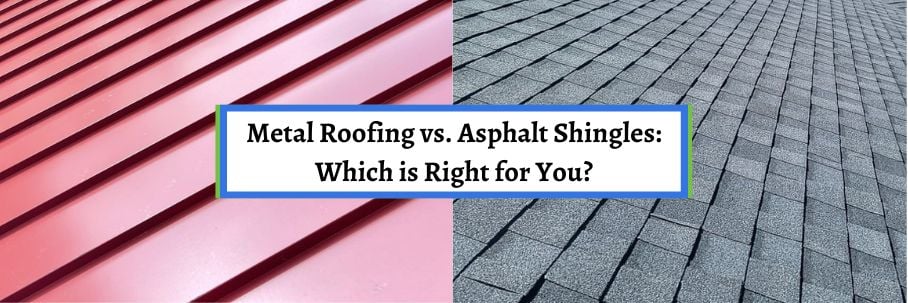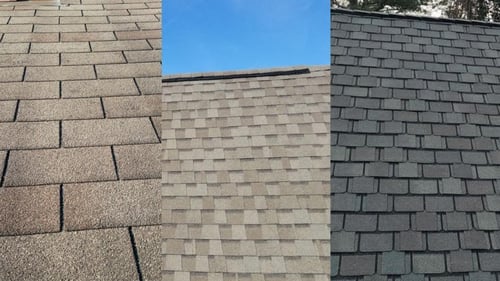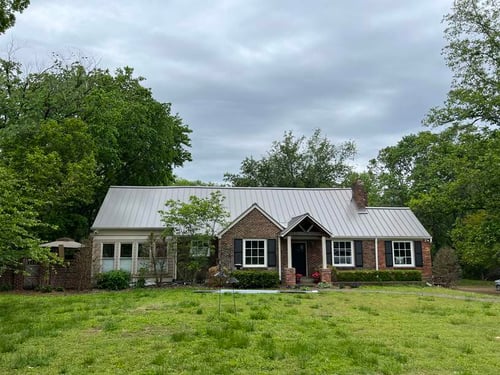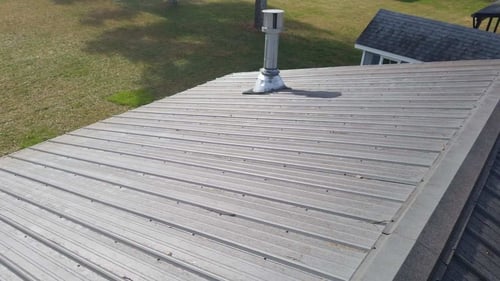Roof Replacement | Asphalt Shingle Roof | Metal Roof
Metal Roofing vs. Asphalt Shingles: Which is Right for You?

Asphalt shingles have dominated the residential roofing industry for decades. However, metal roofing is closing in on becoming just as popular.
Even with the rise in popularity, most homeowners don’t know much about metal roofing. This makes it impossible to determine if metal roofing or asphalt shingles is the right choice without an honest comparison.
For over 30 years, the team at Bill Ragan Roofing has helped homeowners find the perfect roofing material for their budget, home’s aesthetic, and more. Because of this, I’ll help you determine if metal roofing or asphalt shingles is the best option for your roof replacement.
This article compares metal roofing to asphalt shingles on the following:
- Cost
- Lifespan
- Warranties
- Maintenance
- Resale value
Understanding the difference between asphalt shingles and metal roofing
Before getting to the match-up, let’s do a quick overview of asphalt shingles and metal roofing. Below is some basic information, plus the main advantages and disadvantages of each.
What are asphalt shingles?
Asphalt shingles consist of fiberglass, tar, and asphalt granules on a fiberglass mat. They come on individual strips that are layered and staggered from the roofline to the top of the ridge when installed.
 (Left to right: 3-tab, architectural, luxury)
(Left to right: 3-tab, architectural, luxury)
While there are three types of asphalt shingles, architectural asphalt shingles are the most common. But they’re not only the most common shingle but the most commonly used roofing material in the United States.
Asphalt shingle advantages:
- Affordability
- Ease of repair and installation
- Readily available materials and colors
- Multiple shingle options
- Impact resistant options
Asphalt shingle disadvantages:
- Low curb appeal compared to other materials
- Needs yearly maintenance
- Susceptible to storm damage
What is metal roofing?
Metal roofing is a series of metal panels that are locked together at the seams (standing seam) or screwed down (exposed fastener). Both metal roofing options have their place in residential roofing, but the recommended option is standing seam.
 (Standing seam metal roof)
(Standing seam metal roof)
This is simply because the metal panels can expand and contract freely when going through thermal expansion. If you do get an exposed fastener metal roof system, you’ll have to replace the screws (fasteners) when they start backing out due to the lack of free expansion and contraction.
 (Exposed fastener metal roof)
(Exposed fastener metal roof)
Metal roofing advantages:
- High curb appeal
- Versatility
- Color options
- Long-lasting
- Durable
- Virtually maintenance-free (standing seam specific)
- Plenty of metal options
Metal roofing disadvantages:
- Expensive
- Potential for oil canning (standing seam specific)
- Makes noise when it rains
- Hard to repair and install
- Heavy
Metal roofing vs. asphalt shingles: Which is better?
After learning the general information, let’s get to the head-to-head match-up. The rest of this article compares metal roofing to asphalt shingles on cost, lifespan, warranties, maintenance, and resale value.
Metal roofing cost vs. asphalt shingles cost
Cost is the biggest pain point for homeowners when choosing a roofing material. But no matter which one you pick, it’ll be a large investment.
With that in mind, an asphalt shingle roof is more affordable than metal roofing. Not only do metal panels cost more than asphalt shingles, but they also require more skill and labor to install.
However, it depends on the asphalt shingle type and metal roof. The cost ranges below are for a full roof replacement, not just for the materials themselves.
How much do asphalt shingles cost?
The three types of asphalt shingles range from $4.00 to $8.00 per square foot. To be more specific, 3-tab asphalt shingles (the lowest quality) will cost around $4.00 per square foot.
Architectural asphalt shingles are of higher quality but cost around $5.00 to $6.00 per square foot. The highest quality and long-lasting luxury asphalt shingles cost around $8.00 or more.
How much does metal roofing cost?
Metal roofing costs range from $4.50 to $16.00, depending on the type of metal roof and metal. An exposed fastener metal roof will be on the cheaper end of the price range, but maintenance fees come later when the fasteners need to be replaced.
A steel standing seam metal roof will cost around $12.00 to $16.00 per square foot. However, if you want a premium metal like copper, you’re looking at $30.00 to $50.00 per square foot.
Metal roofing lifespan vs. asphalt shingles lifespan
The lifespan of a roof is how many years you can expect to get out of it after installation. No matter the material, your roof gets as close as possible to its maximum lifespan when it’s properly installed and adequately ventilated.
With that in mind, metal roofing typically lasts longer than asphalt shingles. But just like cost, it depends on the specific shingle and metal roof.
How long do asphalt shingles last?
On average, an asphalt shingle roof lasts around 20 years. However, each asphalt shingle has a different lifespan.
3-tab asphalt shingles have the shortest lifespan, at 20 years (maximum). Architectural asphalt shingles should last 22-25 years, but this all depends on installation quality.
Luxury asphalt shingles are larger and thicker, which gives them a lifespan of 30 years or longer in perfect conditions.
How long does metal roofing last?
An exposed fastener metal roof lasts around 20 years. With maintenance, you can get up to 30 years.
On the other hand, a steel standing seam metal roof will last a minimum of 30 years and can last up to 50 years in the right conditions. If you get a copper, stainless steel, or zinc standing seam metal roof, you won’t have to replace the roof in your lifetime.
Metal roofing warranties vs. asphalt shingles warranties
Roofing material warranties are crucial to protect your investment in the event you get a defective roof. The truth is, there’s no clear winner in this category.
Both metal roofing and asphalt shingles come with great material warranties. However, they cover very different things.
What warranties come with asphalt shingles?
All asphalt shingles come out of the package with a warranty. 3-tab asphalt shingles come with a standard 25-year prorated, limited warranty from the manufacturer.
Both architectural and luxury asphalt shingles come with a 30-year warranty (prorated after 10 years). However, if you use a single manufacturer’s roofing components, you can register your roof system to get an enhanced warranty.
Once you register your architectural or luxury asphalt shingle roof with the manufacturer, the enhanced warranty covers your roof for the next 50 years. Just know that your roofing contractor must also be certified by the manufacturer to offer this warranty.
What warranties come with metal roofing?
Unlike asphalt shingles, metal roofing doesn’t come with warranties on the metal panels themselves. Instead, it comes with a warranty on the painted finish that protects the metal from the elements and potential damage.
The length of an exposed fastener’s painted finish warranty depends on the manufacturer. On the other hand, steel standing seam metal roofing comes with a Kynar 500 painted finish.
After installation, you’ll get a 30-year warranty on the Kynar 500 applied to the metal panels. But while the warranty is for 30 years, the painted finish doesn’t necessarily disappear once it expires.
Metal roofing maintenance vs. asphalt shingles maintenance
Every roof needs maintenance to keep it running smoothly and check vulnerable areas susceptible to a problem. Depending on the type of roofing material, it will be annual, biannual, or quarterly maintenance.
With that in mind, asphalt shingles require more routine maintenance than metal roofing.
How much maintenance do asphalt shingles need?
No matter the shingle, an asphalt shingle roof needs to be maintained and inspected at least once a year. This is mainly to check pipe boots, backed-out nails, clear debris from valleys, and other preventative measures to ensure your roof stays leak-free.
How much maintenance does metal roofing need?
A standing seam metal roof requires virtually no maintenance after installation. However, I still recommend getting it inspected once a year or every other year.
-1.png?width=500&height=409&name=ScrewDownMetalScrewsWallowed%20(2)-1.png) (Screws wallowed out on exposed fastener metal roof)
(Screws wallowed out on exposed fastener metal roof)
On the other hand, a screw-down panel metal roof needs routine maintenance to replace the fasteners. Remember, the metal can’t expand and contract because it's screwed through the metal down to the decking.
Metal roofing resale value vs. asphalt shingles resale value
No matter what roofing material you get, a new roof increases your home’s value. This means you’ll recoup some of the money you spent on your initial roof investment.
While both materials have resale value, asphalt shingles have a higher percentage of cost recouped than metal roofing.
Asphalt shingles resale value
According to the 2023 COST VS VALUE REPORT, the national average ROI on an asphalt shingle roof is 61.1%. Using the national average for an asphalt shingle roof is $29,136 from the same report, this means you can recoup $17,807 of the original $29,136 in resale value.
Metal roofing resale value
Using the same report for a standing seam metal roof, the 2023 national average cost for a standing seam metal roof is $47,414. Even though metal roofing is more expensive and more durable than asphalt shingles, the national average ROI is 48.9%.
This means you can expect to recoup $23,163 in resale value on a standing seam metal roof.
Is metal roofing or asphalt shingles right for you?
Now, you know how metal roofing and asphalt shingles compare. The only other thing to compare would be curb appeal, but that’s based on personal taste that differs for everyone.
By now, you should have a good idea of which one is right for you. The truth is asphalt shingles are more affordable and the better option for homeowners on a tight budget.
However, you won’t truly know until after talking to a roofing contractor and getting honest feedback. Unfortunately, honesty is hard to find in the roofing industry.
That’s why finding a reputable roofer you can trust is crucial. But how do you do that?
Check out 7 Tips to Find a Great Roofing Contractor to help you spot a reputable company in a sea of options in your local area.


